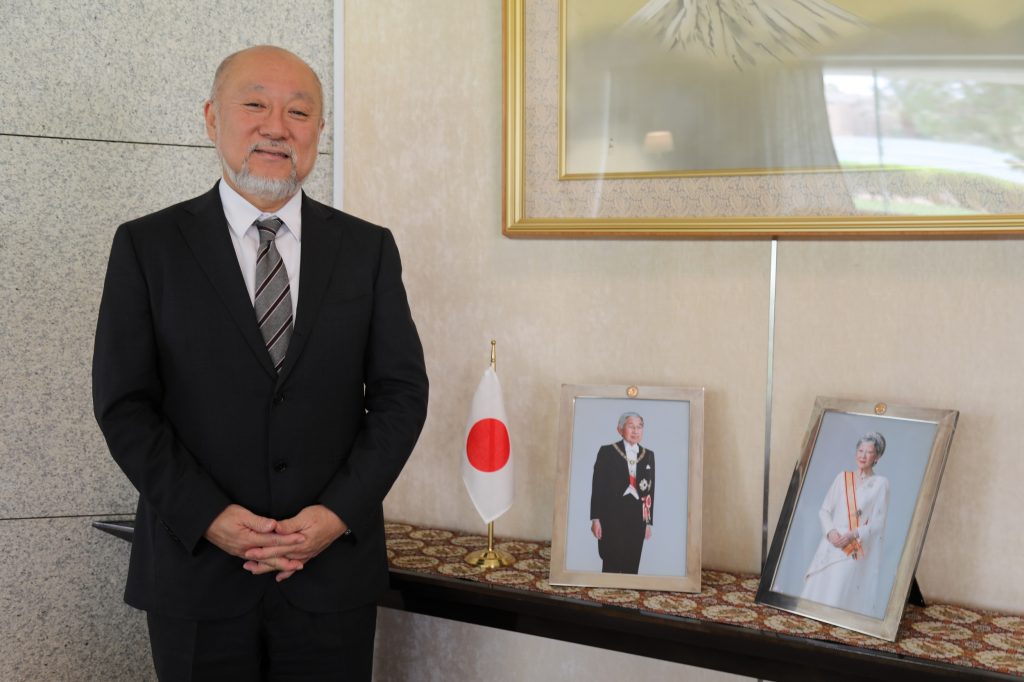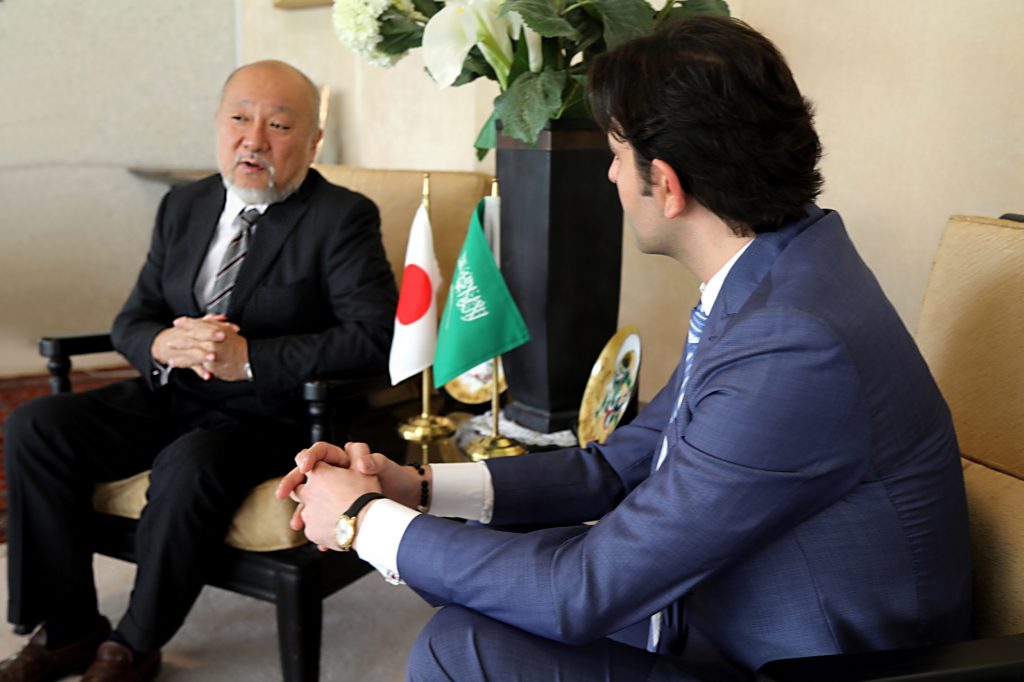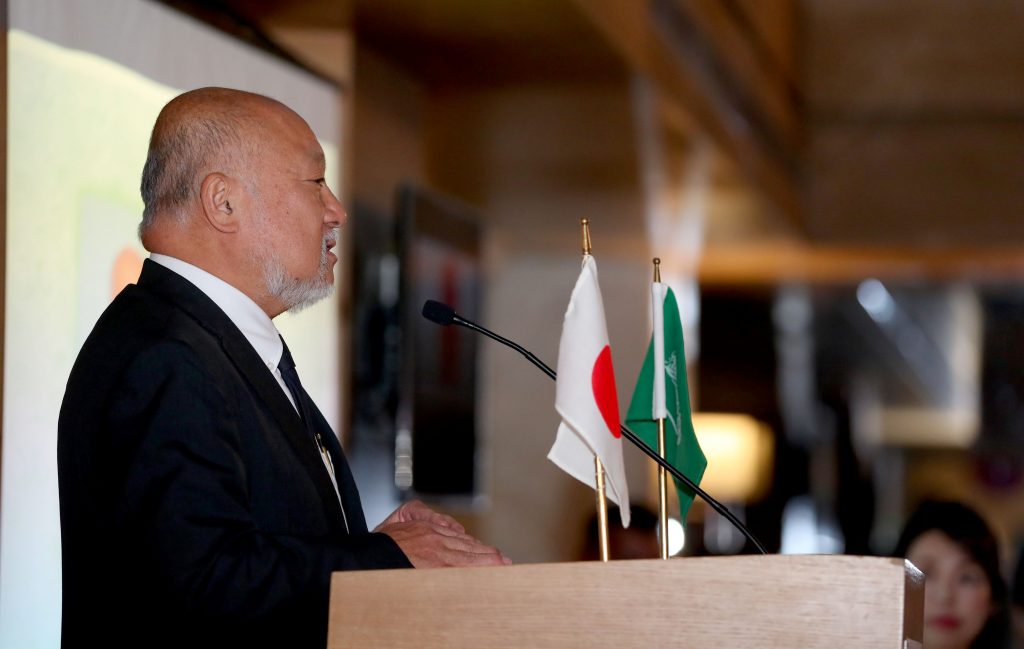





Alexander Woodman
On Oct. 22, as many as 5,000 official guests and high-profile visitors from 195 countries gathered to join thousands of cheering Japanese people for Emperor Naruhito’s enthronement ceremony. On the eve of this grand event, Arab News Japan was launched in Tokyo. Both the events were recognized as the beginning of a new era in Japan-Arab relations.
This relationship has been rooted in strategic, business, cultural and trading collaborations. Japan gets 85 percent of its oil from Gulf Cooperation Council (GCC) countries, whereas various manufacturing goods from Japan are imported to GCC countries. While the political and diplomatic relations are improving, the people-to-people relations are still open for growth.
Coinciding with the launch, Arab News collaborated with YouGov to conduct a Pan-Arab poll: “How Arabs View Japan.” With a sample size of 3,033 Arabic speakers belonging to 22 nationalities, the findings highlighted the various dimensions of business and trade relations, peace and cooperation and the Arab perception of culture, society and geography of Japan.
Speaking at the event organized to announce the survey results, Japan’s Ambassador to Saudi Arabia Tsukasa Uemura said: “I am sure this launch will record the birth of a new era of people-to-people understanding, sharing and caring.” Following this, there was a conversation with Uemura on the various dimensions of Saudi-Japan relations and what they promise in the future.
Q: When studying the history of the Kingdom of Saudi Arabia and Japan, one notices the word “tradition” in almost every other sentence. Can you speak about the value and importance of tradition and its significance to these countries?
Uemura: When I ask Saudi people about Japan, they often mention “high technology”, “animation” and “sushi.” I do not deny that such things have also contributed to the publicity of Japan in the world. However, I would like Saudi people to know more about Japan, which has a unique history and tradition. The modernization of Japan began 150 years ago, when the Meiji government tried to unite people, who were living in a feudalistic system, and made them cooperate for one purpose — to become a modern nation, which could compete with Western capacities. Japanese people learned Western technology and systems from foreigners and incorporated them into the Japanese systems. Saudi Arabia has a similar history, in which King Abdulaziz led competing tribes to unite the Kingdom. We see similarities in the modern history of Saudi Arabia and Japan as well. They are two countries with common lessons to share as a beacon to the future. Since Japan supports such reforms, I hope Saudi people can achieve development in a way that suits Saudi traditions and society.
Q: “Wa,” the Japanese educational model, which translates as “harmony,” calls for cooperation and respect for social roles rather than individuals. As an ambassador, how do you build this harmony in bilateral relations of the countries you serve?
Uemura: “Wa” is one of the typical Japanese ethics, which has multiple meanings, such as “peace”, “no confliction” and “harmony.” Prince Shotoku, a legendary figure in the 7th century said, “harmony is to be cherished.” The Japanese people learn this ethics from childhood. They learn about working for the sake of others not only for the benefit of themselves. They are taught to avoid selfish behavior. The politeness Japanese people exhibit to foreigners is often praised by other nationalities, including Arab people. “Wa” certainly makes a base for building a good and reliable relationship with other countries. The concept could be a model of thought to avoid conflict, foster forgiveness and promote reconciliation when a conflict happens.
Q: The year 2005 was celebrated as the 50th anniversary of the establishment of productive diplomatic relations between Japan and Saudi Arabia. Can you share your vision of the 100th anniversary celebration? In what area would you expect the Saudis and Japanese to build a robust path for cooperation and harmony?
Uemura: Saudi-Japan bilateral relations in the last century mainly developed along with oil trade and business transactions. Japan imports more than one million barrels per day of oil from Saudi Arabia, which is the single largest supplier of oil for Japan. Several joint projects and investment programs are in process as well. At the same time, two countries have tried to shift business relations into much diversified strategic partnership. Political dialogues and cooperation to combat piracy in offshore Somalia are the notable examples. Japan is determined to build much more amicable and broader relations with Saudi Arabia as indispensable partners.
Q: The far-reaching bilateral relations are a strong indication of the mutual respect between the Japanese and Saudi royal families. What are the essential factors that are necessary to retain and foster the constant union of these two powerful dynasties?
Uemura: The Imperial Family of Japan and the Saudi Royal Family have enjoyed friendly relations for many decades. For instance, Emperor Naruhito visited Saudi Arabia for the first time in 1994, with the crown princess. Since then, Naruhito has visited the Kingdom several times. King Salman visited Japan twice in the last five years. Crown Prince Muhammad bin Salman also paid an official visit to Japan in September 2016, as the deputy crown prince.
Emperor Akihito abdicated the throne on April 30, and Naruhito ascended the throne. Such a cordial relationship will persist and develop in upcoming years.
Q: As part of Saudi-Japan Vision 2030, the Saudi government expects Japan to be a significant partner with the implementation of public-private partnership (PPP). Which areas have succeeded in the Japan PPP sector and can be implemented in Saudi Arabia?
Uemura: In 2017, Prime Minister Shinzo Abe held a summit meeting with the Custodian of the Two Holy Mosques King Salman. At that meeting, both sides authorized Saudi-Japan Vision 2030, which is a compilation of the basic directions for bilateral cooperation and the specific projects. It was the outcome of a discussion under the framework of the inter-governmental dialogue called “Joint Group for Saudi-Japan Vision 2030,” the formulation of which was decided by Crown Prince Mohammed bin Salman and Abe in September 2016.
As a new compass for Japan-Saudi cooperation, two countries will aim to leverage synergies of the Saudi Vision 2030 — an economic and social blueprint of the government, aspiring to reduce its dependence on oil and create employment, as well as Japan’s Growth Strategy, seeking to achieve an annual GDP of JPY 600 trillion ($5.5 trillion) per year. To maximize these synergies, both sides will develop comprehensive cooperation, composed of three pillars: Diversity, innovation and soft values, which are unique factors of Japan. Nine prioritized areas have been set in the concrete partnership with the participation of 41 Japanese and Saudi Arabian ministries, agencies and organizations.
Q: The A.W. Saudi-Japan Healthcare Forum 2018 was organized within the frameworks of the Saudi-Japan Vision 2030. Can you please explain the areas highlighted for health professionals of these two countries during this forum?
Uemura: The two countries organized the forum in Riyadh under Saudi-Japan Vision 2030. More than 200 local and foreign medical specialists in diabetes, oncology, endoscopy, emergency and disaster management were present to exchange their experience. Many Japanese private companies also attended and exhibited their high-quality medical devices. In the forum, experts belonging to both the countries discussed concrete cooperation in each area. Furthermore, tremendous business opportunities were shown by Saudi and Japanese business representatives. Health care has always been a serious concern for both Saudi Arabia and Japan. I believe that now it is the time for two countries to take a step further to a new stage in their cooperation.
Q: Can you discuss scholarship programs implemented and promoted by the Embassy of Japan for the students of Saudi Arabia and vice versa?
Uemura: Without a doubt, education is the key component to build and strengthen the ties between Saudi Arabia and Japan. There is a Japanese government scholarship program – called the Ministry of Education, Culture, Sports, Science and Technology scholarship. Young Saudi students, researchers and teachers are sent to Japan to learn the language, science, art and business twice a year through this program. This is part of the bilateral cooperation within the framework of Saudi-Japan Vision 2030. Saudi Arabia also provides its youth with a great opportunity through The Custodian of the Two Holy Mosques’ Overseas Scholarship Program, which sends them all over the world, including Japan. Many of those, who have studied in Japan under the previous scholarship program, now are active and prominent professionals in many fields in both the Saudi and Japanese societies.
Q: During the Riyadh International Book Fair in 2017, a specific area in the Japan Embassy exhibited books, relevant to Japanese culture, the art of calligraphy and Origami. How would you evaluate the level of literacy of this new generation? In your opinion, what do today’s readers focus on when they are reading?
Uemura: In my opinion, young generations not only in this country but also worldwide, become more visual-oriented, being fascinated by more visually appealing content, such as on SNSs. However, even to this new generation, which finds these contents more appealing than the words in books, Japanese traditional culture, like the art of calligraphy, architecture, cuisine, garden, martial arts and tea ceremony represented in books, can still speak with the hearts of young Saudi readers.
Japanese people appreciate the simplicity in art, the lifestyle, which holds deep philosophy as well, and whose mentality, I think, Saudi readers appreciate and find interesting. Saudi Arabia and Japan are at different ends of Asia. It seems like the two countries have a very different culture on a surface level. However, we truly thank Saudi young readers for appreciating both traditional and new pop culture by going through pages of those picture books, and the books representing the mentality of Japanese people and culture.
Q: During the Iftar reception in Saudi Arabia, you hosted a gathering of alumni of Japanese universities and their families. What role does education play in the promotion of relations between the two countries and what global models of educational excellence can they follow?
Uemura: The amount of information people can get in Japan about Saudi Arabia through media is still very limited, and the psychological distance existing between the two countries is significant. However, I truly hope that these Saudi students, currently studying in Japan and Saudi Arabia and the alumni of Japanese universities will enhance and strengthen the ties between two countries. The acquisition of advanced technology, knowledge and skills is only a part of their experience in Japan. Learning each other’s history, ethics and social life is also crucial, which I believe makes it possible for the Kingdom and Japan to create a unique and new model of development in the coming decade. The Embassy will continue to encourage Saudi youths to go to Japan through the scholarship programs and provide opportunities for the Saudi alumni of Japanese universities, currently residing in Saudi Arabia, to reconnect with other alumni, by hosting events such as the Iftar reception.
Q: According to the International Religious Freedom Report of 2008, there are approximately 125,000 Muslims in Japan; 10 percent of whom are Japanese. What, in your opinion, is the best way for people to develop a knowledge and understanding of the different cultures within the society? What is the best way for each of them to co-exist peacefully?
Uemura: Japan is known as a polite country which respects harmony. That politeness goes to those who preach other religions, including Islam. During the Meiji Restoration, which renovated Japan 150 years ago, Japanese people gained a lot of knowledge on technology, social systems and the education in foreign countries. Additionally, during the Restoration, we achieved modern society by abolishing feudalism, transforming society in a more inclusive one, and giving a fair chance to everyone to develop their talents and make their wishes happen. As a result, Japanese people have the basis and mentality to welcome the diversity and learn from others, including religious minorities.
Q: Although Japan is a Muslim-minority country, there are many impressive mosques which serve the local Islamic community. How does that translate into Japan’s cultural diplomacy and show respect for others?
Uemura: Japan will host the Tokyo 2020 Olympic and Paralympic Games next year. During this preparatory period, the welcoming atmosphere toward foreigners is growing. The organizers will offer more Muslim prayers room facilities, mosques and halal food restaurants.
Japanese are curious, open, hardworking and respectful people. The aim of the Japanese is to try to learn through the differences. I expect Saudi students and alumni to become cultural diplomats, telling Saudis about Japan. I also encourage our diplomats and staff to promote Saudi Arabia, whether it is during private or public occasions, telling Japanese people about the reality and beauty of Saudi Arabia and its people. I strongly believe that this kind of grassroots activity by the people, who know the actual life in both countries, will pave the way for more inclusive and understanding society, respecting religious, racial and cultural minorities.
Alexander Woodman is an author based in the Gulf. His research interests include global health, international health policy development transnational and transcultural health politics, ethics, as well as international diplomacy [email protected].